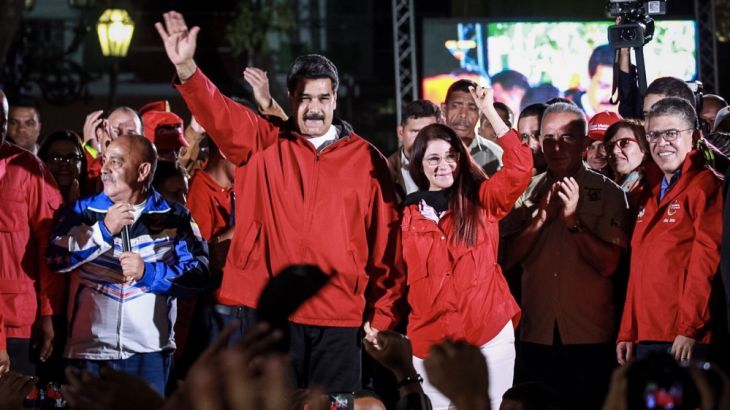Venezuela faces more isolation after controversial vote
Mexico, Colombia and Peru join US rejecting Venezuela’s election results as Washington imposes sanctions on Maduro.

The United States, Mexico, Colombia and Peru among other countries have said they do not recognise the results of Venezuela’s election of an all-powerful new legislative body while the European Union has expressed doubt it could accept the outcome.
Nikki Haley, the US envoy to the UN, on Monday, called the vote a “sham”, and the US treasury department added President Nicolas Maduro to a list of individuals subject to financial sanctions for undermining democracy in Venezuela.
“Yesterday’s illegitimate elections confirm that Maduro is a dictator who disregards the will of the Venezuelan people,” Treasury Secretary Steven Mnuchin said.
|
|
“By sanctioning Maduro, the United States makes clear our opposition to the policies of his regime and our support for the people of Venezuela who seek to return their country to a full and prosperous democracy.”
The EU condemned the “excessive and disproportionate use of force” by Venezuelan police and troops against the people protesting against Maduro and the new Constituent Assembly, which will supersede Venezuela’s opposition-controlled National Assembly and reform the constitution giving Maduro’s Socialist Party almost total power to rule.
The European Commission said in a statement: “A Constituent Assembly, elected under doubtful and often violent circumstances, cannot be part of the solution.”
However, Russia, Cuba, Nicaragua and Bolivia have stood by Maduro, who shrugged off mass protests and US sanctions on some officials to see through the election.
Russia’s foreign ministry said in a statement that it hopes countries “who apparently want to increase economic pressure on Caracas will display restraint and abandon their destructive plans”.
Bolivia echoed that, urging the world “to respect the democratic process that took place in Venezuela”.
Maduro claims victory
“We have a Constituent Assembly,” Maduro said in a speech to hundreds of supporters in central Caracas after the electoral authority put Sunday’s voter turnout at 41.5 percent.
According to the opposition, voter turnout was closer to 12 percent, a figure more aligned with the lack of lines that were seen at many polling stations.
The new Assembly is made up solely of members of Maduro’s ruling Socialist Party as the opposition boycotted the vote.
It is due to be installed on Wednesday. Its members include Maduro’s wife, Cilia Flores.
READ MORE: What is a National Constituent Assembly?
“We do not recognise this fraudulent process,” said an opposition leader, Henrique Capriles.
The opposition coalition, the Democratic Unity Roundtable, said the new body was a rubber-stamp mechanism for Maduro to rule as a “dictator”.
Al Jazeera’s John Holman, reporting from Caracas, said the members of the National Assembly, which lost most of its powers, are mystified about the changes.
“They are saying ‘We have been democratically elected by 40 million Venezuelans. How can we bend [to the new assembly]?’,” he said. “But there is little that they can actually do apart from getting people out to the streets and try to persuade people to come over to their side.”
People have already been in the streets protesting against the government for four months. More than 120 people have been killed in clashes with the police.
More protests were planned for Monday despite a ban on demonstrations imposed by Maduro that threatened up to 10 years in prison for violators.
|
|